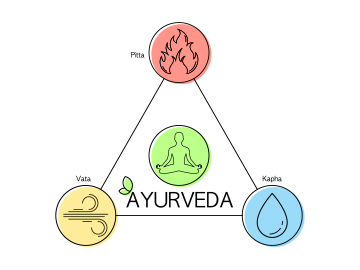Ayurveda relies on the principle of keeping the three doshas of the body balanced. When the kapha vata and pitta doshas are all in complete alignment with each other, the human body functions harmoniously without any issues. However, due to our lifestyle, diet, mental state and external environment, an imbalance in doshas is not uncommon.
Currently, the entire global population is facing great turmoil in light of the coronavirus pandemic. This has resulted in widespread panic and a large number of people are suffering from immense stress on a day-to-day basis. Stress in itself is both a cause and an effect of a vata imbalance. Leaving this unchecked, will further destroy the delicate balance of vatas and cause the kapha and pitta levels to vary as well.

SYMPTOMS OF VATA IMBALANCE
Vata imbalance manifests itself with several tell-tale effects on both the mind and body.
- Feeling cold and uncomfortable
- Dehydration and excessive thirst
- Dryness of skin, eyes, lips and joints
- Digestion issues including bloating, constipation and indigestion
- Stress, anxiety and mental fatigue
- Irritation of sinuses, nose due to extreme dryness
STEPS TO MANAGE VATA IMBALANCE
By bringing the vata imbalance under control, it is possible to reverse all the negative effects and reach a state of mental and physical equilibrium which promotes health and wellbeing. This can be done by targeting the vata imbalance and taking measures to systematically change it.
- Drink plenty of warm water several times a day. This is absolutely vital to restore normal bodily function.
- Restore moisture to the skin with self-massage or Abhyangam with oils to deeply penetrate and restore skin tissue.
- Cook with sesame, almond oil to promote digestive health through the calming of vata.
- Eat food which falls under the 3 S’s – sweet, sour and salty. Do not go overboard with this, but when consumed in moderation, this helps balance vata.

- Warm and hearty foods including soups, casseroles and broth can help ease digestion.
- Ayurveda also prescribes inclusion of herbs such as cumin, cardamom, cinnamon, black pepper, turmeric and saffron into the regular diet.
- Stick to a regular sleep schedule. This allows the body to function normally, and restores balance from within.
- Drink ginger tea with honey to calm the stomach. Golden milk is another great way to pacify vata.
- Yoga also helps alleviate symptoms of vata imbalance. In particular, perform the following asanas: Surya namaskar, cat stretch, Virabhadrasana (warrior pose) and, Vrikasana (Tree pose) daily for a few minutes to see results.
Ayush provides phone consultation with highly skilled ayurvedic practitioners during this ongoing lockdown. If you are experiencing any symptoms which indicate vata imbalance, please contact our Ayurveda doctors to acquire a personalized ayurvedic regimen which is sure to help you achieve balance of doshas.




